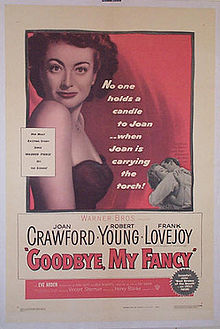
GOODBYE MY FANCY
US, 1951, 107 minutes, Black and white.
Joan Crawford, Robert Young, Frank Lovejoy, Eve Arden, Janice Rule.
Directed by Vincent Sherman.
Goodbye My Fancy is a line from a Walt Whitman of farewell. It sums up the theme of this comedy-drama about a congresswoman, played strongly by Joan Crawford, and her memories of a young romance with a college professor, Robert Young. After twenty years, she goes back for an honorary degree and meets the love of her life - and has to re-assess her relationship with him. Frank Lovejoy portrays a war photographer who also wants to marry her. Eve Arden has her typical enjoyable wisecracking role. Her mind is on the tip of her tongue. A very young Janice Rule appears as Robert Young's daughter
The film is based on a play by Fay Kanin and might seen unexceptional - except that its strong emphasis on education and freedom, lack of censorship is very topical for 1951, given the climate of the United States, the House of Unamerican Activities, the anti-communist atmosphere and the Black List.
The film is one of Joan Crawford's least known films - but is enjoyable and makes its points.
1. Interesting comedy-drama? Piece of Americana of the early '50s?
2. Warner Bros. production, black and white photography, the atmosphere of the university? Musical score, songs - the theme of 'I'm Going to Change Myself'?
3. The title, the quote from Walt Whitman, the application to Jim? Agatha's farewell to him?
4. Joan Crawford as Agatha Reed: the strong congresswoman, chairing the meeting, the men coming out, desperate? Her decision to get the honorary degree? The plans, the encounter with Matt and his pursuit? Strong and determined stances? Her friendship with Woody? Going to the university, nostalgia and crying? The memories of the university and all that it meant to her? The irony of her being expelled after the night with Jim? meeting Ginny and seeing Jim's daughter? Learning about the physics professor and his broadmindedness, about to be sacked? The reception, the formalities, the former teachers? The choir? Formal receptions Her discussions with Jim, the romance, the amphitheatre? The clashes with Matt? The set-up with the physics professor, her taking a stance? Griswold and his business perspective and his philistine attitude towards education? The censorship? Her meeting Ellie again and reminiscing, Ellie putting her foot in it? Ginny and her being ashamed of her father? Agatha telling her the truth? The cancelling of the film, her decision to go? Jim's resignation? Her realisation that she was meeting him for the first time? Her decision to marry Matt? A strong character, credible?
5. Jim and his work at the university, his place in Agatha's memory, her sacrificing her career for his career? Her disappearance out of his life? Marriage, Ginny? Administration, a great builder? His compromises? The pressure of Griswold? Meeting in the amphitheatre, indecisiveness about the professor, about the banning of the film? His watching, offering his resignation? His continuing on?
6. Matt as the war correspondent, his memories of Paris, the proposal and the story about the roses? Seeing Agatha again, organising the trip to the university, listening in, the photos, overhearing her confrontation with Jim? Going with her at the end?
7. Griswold and his narrowness, symbolising American attitudes at the time? Ellie and her seeming lightheadedness, her shrewdness, friendship with Agatha? Pressure on Jim? The physics professor and his breadth of vision, education, his not feeling sorry for himself and deciding to stay on?
8. The personalities of the university: the organiser, the leader of the choir, the old professor? The younger generation, commencement and their hopes?
9. Wit in the screenplay? Romantic situations? Confrontations? Themes of freedom in America, 1951?